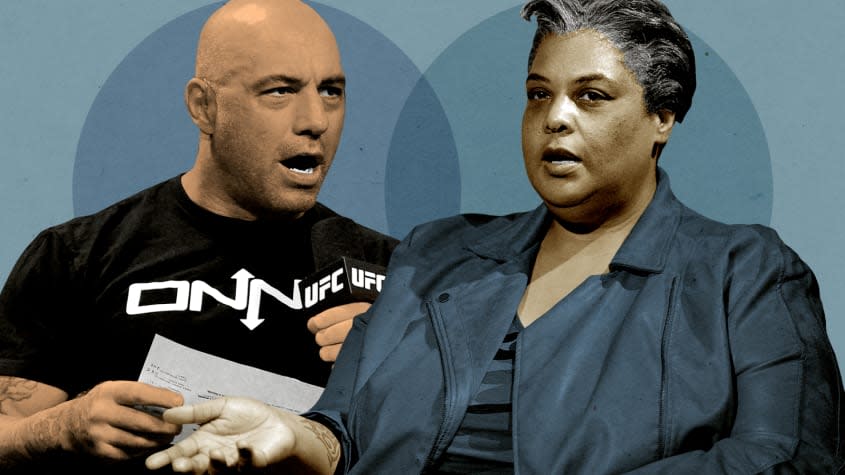The Joe Rogan controversy is actually about the freedom of association

- Oops!Something went wrong.Please try again later.
The author and podcaster Roxane Gay has joined the (so far, small) exodus of artists who are choosing to leave Spotify rather than share a platform with Joe Rogan and his COVID misinformation. "It was a difficult decision — there are a lot of listeners on the platform," she wrote Thursday in The New York Times, "and I may never recoup that audience elsewhere."
This isn't the first time Gay has taken this kind of stand. In 2017, she pulled a forthcoming book from the publisher Simon & Schuster after that company gave a six-figure book deal to right-wing provocateur Milo Yiannopoulos. (The contract was later canceled after he got too provocative.) On Thursday, Gay explained her departure from Spotify by looking back at that incident.
Yiannopoulos "had every right to air his political beliefs, but he didn't have a right to a lucrative book contract," she wrote. "Nor did I, for that matter. The right I did have was to decide who I wanted to do business with."
It's not about censorship, in other words. It's about freedom of association.
Much of the commentary about Neil Young, Joni Mitchell, and the other artists leaving Spotify over Rogan's podcast has cast the kerfuffle as another example of "cancel culture." Young and Mitchell "are the latest to join a growing number of journalists, academics, and artists in favor of censorship," wrote law professor Jonathan Turley. But that's not struck me as quite right. For one thing, Rogan's podcast is too big to cancel — he has a reported 11 million daily listeners. As a number of observers have pointed out, that number would probably get bigger if he left his exclusive Spotify contract and was able to distribute across multiple platforms.
Young, meanwhile, left Spotify not with a cry for Rogan to be canceled but a demand to be released from the platform. "They can have Rogan or Young," he wrote in a public letter. "Not both." That's a claim rooted in a right to associate — or not — with the persons and companies of his choosing.
Americans love to fight about freedom of speech, but we don't as often talk about freedom of association, which is also a First Amendment right. That's a shame. "Like free speech, freedom of association has been enshrined in liberal democratic jurisprudence here and across the world; liberal theorists from John Stuart Mill to John Rawls have declared it one of the essential human liberties," Osita Nwanevu wrote in 2020 at The New Republic. "Yet associative freedom is often entirely absent from popular discourse about liberalism and our political debates, perhaps because liberals have come to take it entirely for granted."
Gay is plenty critical of Rogan, and of Spotify for employing him. But she doesn't have the power — legal, cultural, or otherwise — to cancel him. Instead, she packed her bags and left. That's her right.
You may also like
Woody Allen goes out with a whimper

